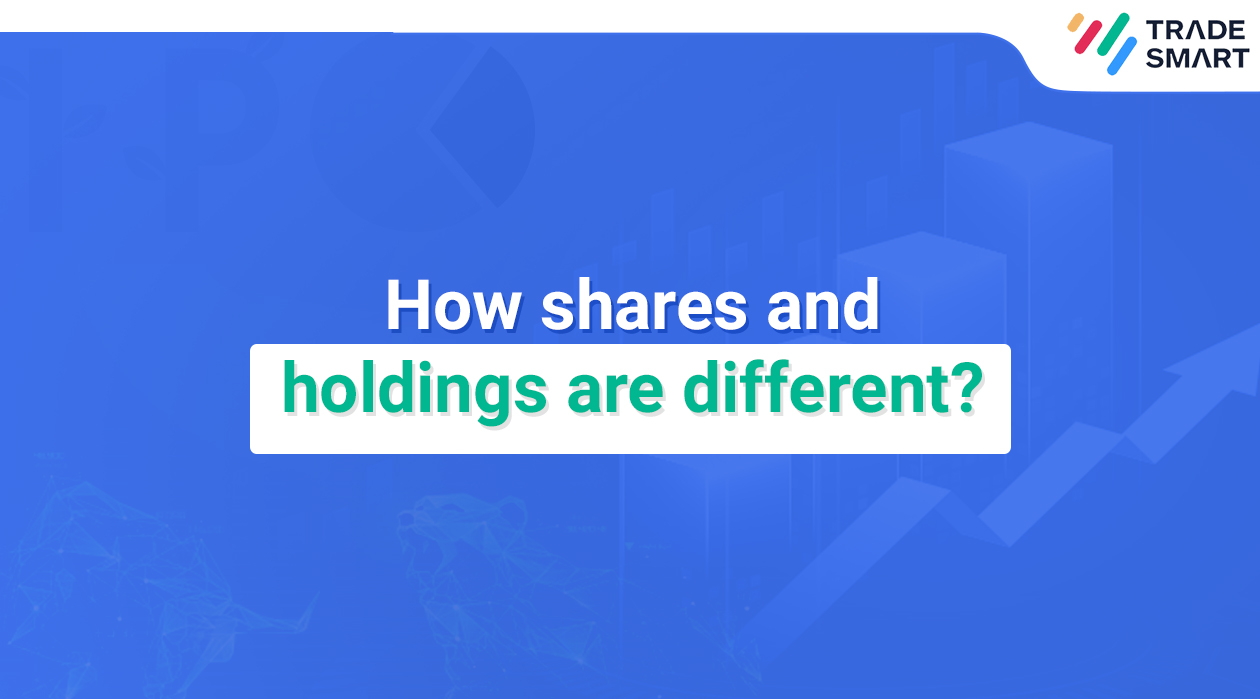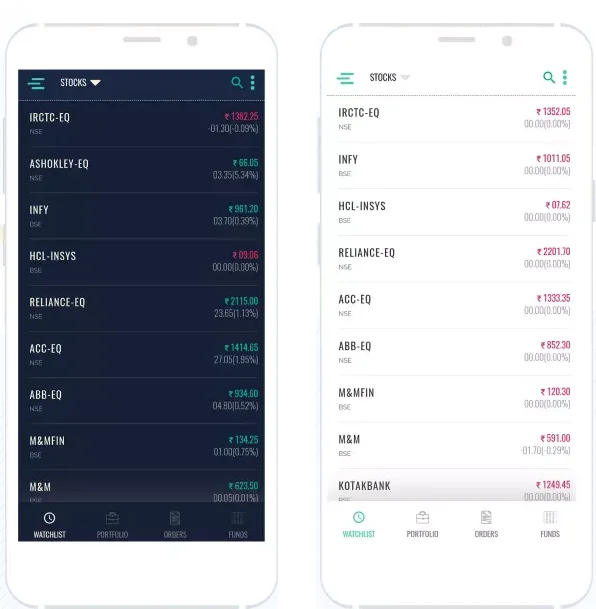How shares and holdings are different
Oct 17 2022 5 Min Read

Introduction
It is easy to confuse these two commonly used terms if you are a beginner in trading in the stock market. However, it is important to know the difference and meaning to plan your transactions without any issues. One such confusing term is shares and holdings. They are often used together but mean different.
A share represents a unit of stock. A company may either choose to issue preferred shares or common stock to investors. A company also issues equity shares in return for capital to investors. There are two kinds of shares, a) preference and b) common shares.
Holdings are the entirety of stocks or shares that an individual holds in his investment portfolio, such as pension fund, mutual fund, exchange-traded funds (ETFs), futures, options, and bonds.
Stock Overview
Let’s discuss a little about stock market holding.
Stocks are a type of financial securities that give stockholders part-ownership in a company. When you buy a company’s stock, you become a stockholder. A stockholder has a claim on the part of the company’s assets and earnings. The stock certificate is proof of ownership and states the number of shares you hold.
You can buy stocks of either a single company or multiple companies. There is no limit to the number of stocks you can hold in your investment portfolio.
Investors buy those stocks of companies that will likely increase in value in the future. When stock price increases, the stockholder sells the stocks and earns a profit. However, a stockholder can also receive a dividend, a part of the company’s retained earnings, either quarterly or annually. Buying and selling stocks is thus a profitable way to make money. Moreover, it reduces market inflation impact over a period.
Shares Overview
A share represents a unit of stock. Shareholders are entitled to the company’s retained earnings in the form of dividends. If you are a shareholder of a company, you get the voting right at the shareholders’ meeting and hold some ownership of the company in proportion to the shares you have bought.
There are two types of shares, equity & preferred shares. Let’s briefly discuss these two shares.
Equity Shares
To raise capital, a company issues equity shares at the cost of diluting its ownership. The value of an equity share is the book value or face value. When more people buy shares, the share price rises, and the share price falls when more people sell shares. As on a stock exchange, the share price is governed by demand and supply.
Most well-established, large-cap companies pay bonuses and dividends to their shareholders. Equity shareholders get a fraction of ownership of the company. They benefit from dividends and capital appreciation. They also enjoy voting rights in the critical matters of the company. Although, the main motive for issuing equity shares is to raise funds for expansion and growth. A company issues equity shares through Initial Public Offering (IPO) to the general public. You can easily trade stocks on the Bombay Stock Exchange (BSE) and National Stock Exchange (NSE) in India with the help of registered brokers.
Types of Equity Shares
| Ordinary | Preference | Bonus | Rights | Sweat Equity | ESOP |
| Ordinary shares are issued by a company that wants to raise funds so that it can meet its long-term expenses.
An ordinary shareholder will get part ownership of the firm and have voting rights. |
Preference shareholders receive dividends before equity shareholders.
Preference shareholders do not enjoy a common shareholder’s membership and voting rights. |
Bonus shares are the additional shares given to its existing shareholders by the company on the basis of the shares owned by them.
It is issued without any additional cost. |
These shares are issued only for specific premium investors.
They are issued at a discounted price. The purpose of issuing these shares is to raise money to meet financial requirements. |
Employees and directors of a company get sweat equity.
They receive these shares at a discounted price for the excellent work of adding value to the company, providing intellectual property, etc. |
Employee Stock Options are offered to employees as a retention strategy and incentive.
Employees purchase these shares at a predetermined price at a future date. |
Preference shares
Preference shareholders receive dividends before equity shareholders. They are the first to receive payouts from the company. At the time of liquidation, the last payments are made to the preferred shareholders.
Types of preference shares
| Convertible | Non-convertible | Redeemable | Non-redeemable | Participating | Non-participating | Cumulative | Non-cumulative | Adjustable |
| These shares can be easily converted to equity shares. | These shares cannot be converted to equity shares. | These shares can be redeemed or repurchased by issuing company at a fixed date and rate.
These shares provide a cushion to the company at the time of inflation. |
These shares cannot be redeemed or repurchased by issuing company at a fixed date.
These shares are a lifesaver at the time of inflation. |
These shareholders can demand a part of the company’s extra profit at the time of its liquidation when the dividends have been paid to other shareholders. | They receive fixed dividends, but these shareholders do not get the additional option of earning dividends from the extra profit earned by the company. | These shareholders enjoy a cumulative dividend payout even if the company is not making any profit.
These dividends will become arrears when the company is not making a profit and, therefore, will be paid on a cumulative basis when the business generates profits. |
These shareholders will not receive dividends when the company makes no profit.
They cannot claim dividends in future profits or years. |
Here, the dividend rate is influenced by market rates and therefore is not fixed. |
Difference between stocks and shares
| The basis for comparison | Stocks | Shares |
| Meaning | Stocks are a type of financial securities that give stockholders part-ownership in a company. | A share represents a unit of stock. |
| Denomination | Two different stocks of the company may or may not have an equal value. | Two different shares of the company may have the same or equal value. |
| Nominal Value | There is no such value associated with stocks. | There is some nominal value associated with the share |
| Original Issue | Yes | No |
| Paid-up Value | Stocks are fully paid up. | Shares are either partially paid up or fully paid up. |
| Numeric Value | The stock has no numeric value. | A share has a distinctive number. |
Holdings
An individual has an investment portfolio where he holds many stocks and shares. These stocks and shares are called holdings. In the stock market, holdings are present in an investor’s Demat Account.
For instance, holdings present in the Demat account reflect units held by an individual and their availability to trade on a given trading day. But it will not show any profit or loss from the given securities or stocks that are held.
Difference between holdings and shares for sale
When stock market investors place a sell order during trading hours, they can discover in their Demat account that the shares that are “available to sell” do not correspond to the shares that they are already holding in their portfolio. The following factors may be primarily responsible for this phenomenon:
| Basis | What does it mean? |
| Open sell order on BSE/NSE | A sell order on NSE or BSE might still be open but may not be executed yet. Since the order is in progress, account holders cannot duplicate it. |
| Bought on BSE today | If you have bought stocks on BSE today, you cannot sell them on NSE the same day. It can only be done the next day. |
| Bought on NSE today | Similarly, if you have bought stocks on a particular day on NSE, you cannot sell them on BSE the same day. It can be sold the next day onwards. |
| Pledge for Margin | If someone pledges their shares and avail extra margin against the same, then until the investor unpledged them, it cannot be sold further. |
| T2T stock, bought today | T2T stocks, if bought today cannot be sold on the same day. However, it can be sold only after it is delivered to the Demat account of the investor as per the T+2 settlement. |
| Lock-in Period | Shares that are locked for some reason can only be sold when the lock-in period ends or lifts. Therefore, Investors need to watch out for any announcements for lock-in information from the issuing company. |
Conclusion
The main difference between shares and holdings is that a share represents a unit of stock and holdings are the entirety of stocks that an individual holds in his investment portfolio. Shares and stocks are generally used interchangeably. They are financial equities that denote ownership in a public company. Their minor distinction is usually overlooked. To invest in stocks or shares, you need a brokerage account. The major difference between the two is that stock is used to describe a fraction of ownership of one or more companies.
Frequently Asked Questions
There are various reasons an investor buys stocks. First is dividend payment; a company distributes some of its retained earnings to stockholders. The second is capital appreciation; when a stock price increases, the investor can make profits. The third is the ability to influence the company and the ability to vote shares.
Companies issue stocks to raise money to 1) launch new products, 2) pay off debts, 3) build new facilities or enlarge them or 4) expand in new regions or markets.
A holding company holds the outstanding shares of other companies. A holding company does not directly engage in business or provide services like producing goods or services. A holding company acts as an ownership vehicle of other investments or companies. A pure holding company adds the word holding or holdings at the end of its name. For instance, Berkshire Hathaway Inc. is a holding company.
Holdings are the entirety of stocks or shares that an individual holds in his investment portfolio, such as pension fund, mutual fund, exchange-traded funds (ETFs), futures, options, and bonds.
Benefits:
- Stocks offer investors capital appreciation over a long period.
- The stock market provides diversification.
- Investors who invest in stocks receive dividend payouts.
- Stocks are also known as liquid assets as they can be easily converted into cash.
- Investing in stocks has the potential to generate high returns in a short period of time.
- The Stock Exchange Board of India (SEBI) protects the stock market well.
Risks:
- Stock prices move down as well. So, investors may have to suffer losses.
- Common stockholders will be paid last if the company goes bankrupt or liquidates.
- At the dividend payout, common stockholders are paid after preference shareholders.
- A stock’s price can be affected by many factors, such as a company’s faulty product and market fluctuations, economy, or political events.
When a private company chooses to go public, its shares are listed and traded on a stock exchange. The share price is then determined by the demand and supply of shares in the market.

